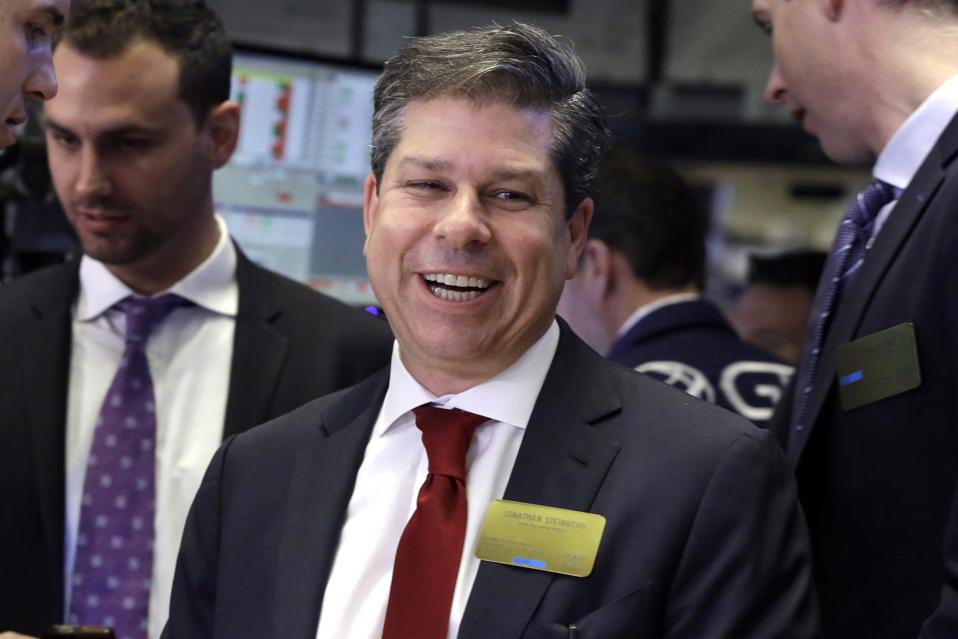Jonathan Steinberg has done an about-face. Two years ago, the CEO of WisdomTree Inc. (WT) sold more than $1 million of his company’s stock. Last month, he bought more than $2 million worth.
Steinberg’s company was among the first to issue exchange traded funds, often called ETFs. It remains one of the top ten issuers of ETFs in the U.S.
Though he’s no shrinking violet, Steinberg is less famous than both his father and his wife. His father, Saul Steinberg, had a reputation as a fierce corporate raider. Among his successful takeovers were Reliance Insurance Co. and Pergamon Press. He also made runs at Chemical Bank and Walt Disney Co.
The younger Steinberg’s wife is Maria Bartiromo, well known to television viewers as a Wall Street commentator, first on CNBC and later on Fox Business channel. A strikingly attractive woman, she was nicknamed “the money honey.”
Before he launched WisdomTree, Steinberg was the publisher of Individual Investor magazine, and was a contestant in a stock-picking contest I used to run for the Wall Street Journal called Investment Dartboard. Contestants’ results were compared with the results from throwing darts at the stock pages.
He won the contest half a dozen times.
In the past dozen years, Steinberg has sold WisdomTree shares on 24 occasions, and has bought the shares nine times. His purchase last month was his largest to date.
Profits at WisdomTree jumped 42% last year, on an eight percent revenue increase.
The company’s net profit margin is handsome at 29%. Return on equity is also strong, 26% in the past year. Analysts figure it will earn about 49 cents a share this year, and the stock (recently at $8.42) sells for about 17 times that figure – not cheap, but not especially expensive.
My guess is that Steinberg will do well on his recent purchase. He owns 9.1 million shares, worth about $77 million.
Devon Energy
Natural gas prices have rarely been lower than they are now (about $1.51 per million British Thermal Units). So it’s noteworthy that Devon Energy Corp. CEO Richard Muncrief spent about $666,000 this month to increase his hoard of Dev0n stock.
Muncrief also bought shares a year ago, as I noted in this column. His latest purchase, on March 4, was 15,000 shares. He now owns about 1.9 million shares, worth about $84 million at Devon’s March 8 price of $46.16.
Devon, based in Oklahoma City, Oklahoma, expects revenue of about $12.4 billion this year. It produces both oil and natural gas, and natural gas accounts for a big share of its reserves. It is also investing heavily in geothermal energy production.
Natural gas sells for about $1.51 per million BTUs today, down from a 20-year average of a little over $4. So to say that Moncrief is making a contrarian bet is an understatement.
I think it’s a shrewd trade. Only twice in the past 20 years has natural gas been as cheap as it is now. Both times it rebounded swiftly and emphatically. As for the oil part of the business, I think that oil will average $80 a barrel or more for the next year or two, giving companies room for good profits.
According to GuruFocus.com, Muncrief’s trades have tended to outperform the Standard & Poor’s 500 Index.
The Record
This column is one in a long series about corporate insiders’ trades. I can tabulate one-year results for 59 columns – all those written from the beginning of 1999 through a year ago.
The stocks I’ve recommended based on insider purchases have beaten the Standard & Poor’s 500 Total Return Index by 0.77 percentage points on average.
The stocks I’ve said to avoid, even though insiders were buying, have trailed behind the S&P 500 by 24.3 percentage points.
Stocks where I noted insider sales have trailed the index by two percentage points.
That almost wraps it up, but there is one more category. There were 14 stocks where I noted insider buying but made no comment, or an ambiguous comment. That group has beaten the benchmark by 16.2 percentage points.
A year ago, I wrote about insider buys at Devon Energy and Stifel Financial Corp. From then until this writing, Devon is down 2.2% and Stifel has returned 36%. The S&P returned 35%.
I also noted that a few insiders had sold shares at Ford Motor Co. Since then, Ford has trailed the index by 27 percentage points.
Bear in mind that my column results are hypothetical and shouldn’t be confused with results I obtain for clients. Also, past performance doesn’t predict the future.
Disclosure: I have no positions, long or short, for myself or clients, in the stocks discussed in today’s column.

